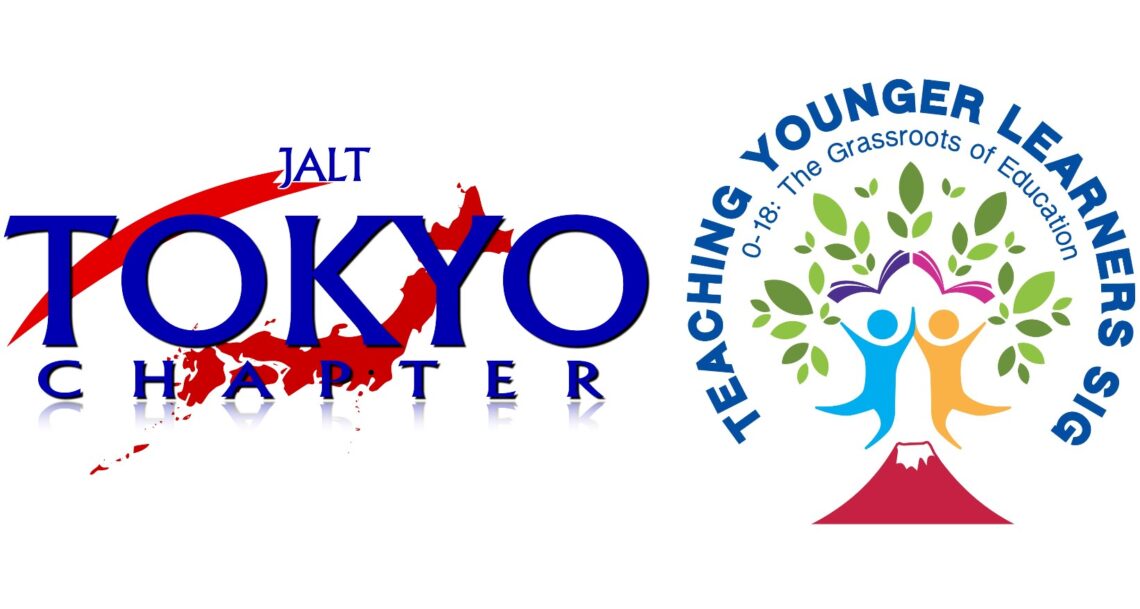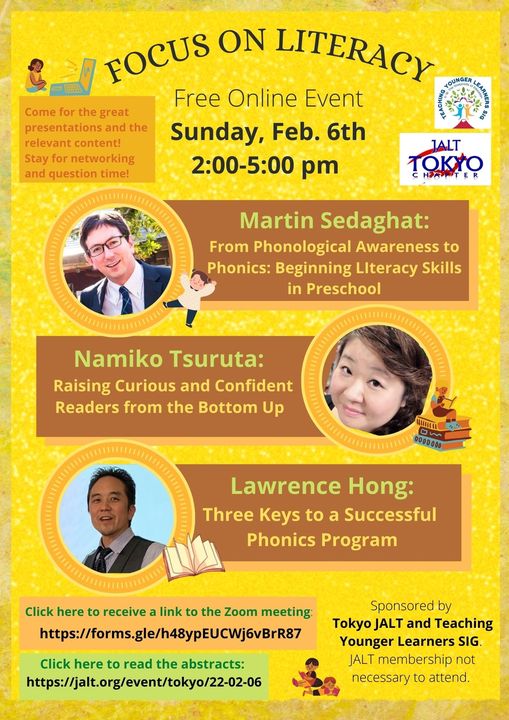
Teaching Younger Learners in Tokyo – Sunday, February 6th, 2:00-5:00pm (Online)

This event, sponsored by Tokyo JALT and the TYL SIG, is for teachers of kids to young adults, so teachers of preschool, kindergarten, elementary school, junior high school, and senior high school, are all encouraged to come! As always, there will be great, short presentations and lots of time for discussion and networking.
Here is the line-up of presenters:
Session 1
- Presenter: Martin Sedaghat
- Title: From Phonological Awareness to Phonics: Beginning Literacy Skills in Preschool
- Abstract:
Digraphs. Alliteration. Onset-rime. What are they and how can they be taught? This presentation will explore the introduction, instruction, and challenges of beginning literacy skills in a Japanese preschool English program. The differences between phonological awareness, phonemic awareness, and phonics will be discussed, along with the sequencing and progression of these skills. Practical and easily made activities and resources for pre-literacy learners will also be shared.
- Bio:
Martin Sedaghat is an English teacher and curriculum designer for the Niigata University of Health and Welfare International Preschool. Originally from California, USA, he has lived in Niigata Prefecture since 2003. Martin is currently studying for his MA in TESOL, and is particularly interested in the use of picture books, board games, and art projects in second language acquisition. He is also serving as the Program Chair for the JALT Teaching Younger Learners Special Interest Group.
Session 2
- Presenter: Namiko Tsuruta
- Title: Raising Curious and Confident Readers from the Bottom Up
- Abstract:
Reading is a skill which most of our EFL learners will hone for the rest of their lives. Rather than worrying about their graded reader homework compliance at the tertiary level, why aren’t we engaging them more in reading many years before that?
Based on my own EFL experience with literacy in the US and my 23 years of EFL teaching experience in Japan, I have found that reading in English is an important but complex process that needs to be encouraged and monitored, and well before our primary school learners pick up a textbook in the 5th grade. Listening to and engaging with picture books as toddlers fosters a love of language that, if nurtured, can develop into independent reading fluency.
Please join me as we review some of the fundamental processes in L2 literacy development. Come ready to discuss what we can do as foreign language teachers to foster our learners’ love of reading. We hope all our learners will succeed in passing the English section of their university’s entrance examination; more importantly, though, we should focus on helping our learners develop more advanced literacy skills, so they can stay current and remain relevant in this ever-evolving global and digital world.
- Bio:
Since 1999, Ms. Tsuruta has been teaching English in nursery, primary and secondary schools as well as working in private language schools and teaching business English in the Kanto area. She has also trained ALTs and JTEs in team-teaching and group learning environments in Ibaraki, Nagano and Tokyo for many years. Ms. Tsuruta is currently Program Director of Global Language Institute (GLI) and Creative Director of thetokyolife.jp. Her most recent presentation was at the 2021 international JALT conference where she shared GLI’s one-year virtual exchange project with students in Japan and Nepal. Her research interests include learner identity, autonomy, performance in education, sustainable learning and education, and diversity and inclusion.
Session 3
- Presenter: Lawrence Hong
- Title: Three Keys to a Successful Phonics Program
- Abstract:
It seems like everyone is teaching phonics these days. In a recent unofficial facebook poll between phonics and sight words, roughly 90% of respondents reported using phonics as their main focus when teaching reading. And why not? Phonics gives students the necessary skills to deconstruct and reconstruct words.
While most reading programs in private language schools focus on phonics, you can be sure that no two programs are the same. So how do you design an effective phonics program? By making sure that learning is achievable, motivating, and meaningful. Just like phonics can break down large words into achievable parts, Lawrence will show you how to deconstruct and reconstruct an effective phonics program that will transform your students into motivated readers.
- Bio:
Graduating in 2006 from the University of California (LA), Lawrence has been teaching English in Japan since 2007 in a variety of contexts, including large eikaiwa chain schools, small private English schools, private kindergartens, and public elementary schools. For the past eight years, he has been running AES Eikaiwa, a private children’s English school in beautiful Tarui, Gifu. As the sole teacher, he has been able to focus on the many different types of personalities of his students and on creating a successful curriculum to serve them all. While his degree in mathematical economics has allowed him to effectively systematize many aspects of his business, he believes that because each child is different, learning within a rigid system is ineffective.
Lawrence is involved with ETJ, JALT, and numerous unofficial professional development groups. He stands on the shoulders of giants, and wouldn’t be where he is today without the help and encouragement from countless amazing teachers and mentors. He enjoys snowboarding and bouldering in his free time, but his recent dad bod will make you question that.
Event in Planning: Scheduled
Event Type: JALT Event
Online Meeting: Yes
Cost for Jalt Members: Free
Cost for non-Jalt Members: Free
Link: RSVP link

